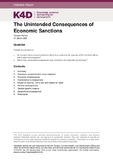| dc.contributor.author | Herbert, George | |
| dc.date.accessioned | 2022-09-15T10:03:13Z | |
| dc.date.available | 2022-09-15T10:03:13Z | |
| dc.date.issued | 2022-03-21 | |
| dc.identifier.citation | Herbert, G. (2022). The unintended consequences of economic sanctions. K4D Helpdesk Report. Brighton, UK: Institute of Development Studies. DOI: 10.19088/K4D.2022.100 | en |
| dc.identifier.uri | https://opendocs.ids.ac.uk/opendocs/handle/20.500.12413/17636 | |
| dc.description.abstract | Economic sanctions are associated with a range of adverse effects, with variable levels of supporting evidence for different kinds of negative consequences. It is frequently challenging to demarcate the boundary between the intended and unintended consequences of sanctions. This rapid review is based on an assessment of 75 separate articles or reports. It found that sanctions apply pressure on targeted states by inflicting economic damage, but the economic disruption is frequently broader than intended with economic damage not being restricted to targeted states. With sections possibly having a negative humanitarian impact, declining health outcomes, increasing the possibility of conflict, terrorism, and undermine the rule of law in targeted states. It also finds that the impact of sanctions on democratisation and respect for human and economic rights remains disputed. Despite the volume of studies published on this topic, there are weaknesses in the evidence base. Many – though not all – econometric studies do not distinguish sufficiently between different kinds of sanctions. As a result, sanctions regimes that may have quite different effects often lumped together, making it challenging to assess whether sanctions can be designed in a way that is likely to avoid specific kinds of adverse effects. In addition, on some important issues, there are major inconsistencies between the findings of different econometric studies. In some cases these inconsistencies are paired with technical debates around whether the methodologies employed on different studies adequately address issues related to the potential endogeneity between the decision to impose sanctions and trends in variables of interest. | en |
| dc.description.sponsorship | Foreign, Commonwealth and Development Office (FCDO) | en |
| dc.language.iso | en | en |
| dc.publisher | Institute of Development Studies | en |
| dc.relation.ispartofseries | K4D Helpdesk Report;1118 | |
| dc.rights.uri | https://www.nationalarchives.gov.uk/doc/open-government-licence/version/3/ | en |
| dc.subject | Development Policy | en |
| dc.subject | Trade | en |
| dc.title | The Unintended Consequences of Economic Sanctions | en |
| dc.type | Helpdesk | en |
| dc.rights.holder | © Crown copyright 2022 | en |
| dc.identifier.doi | 10.19088/K4D.2022.100 | |
| dcterms.dateAccepted | 2022-03-21 | |
| rioxxterms.funder | Default funder | en |
| rioxxterms.identifier.project | K4D | en |
| rioxxterms.version | VoR | en |
| rioxxterms.versionofrecord | 10.19088/K4D.2022.100 | en |
| rioxxterms.funder.project | 0986883a-6d0f-4bb8-9c46-5e0682934d65 | en |

